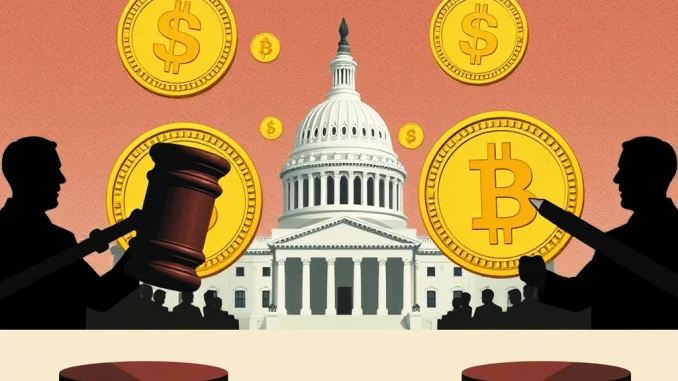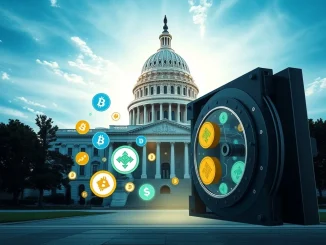
The world of digital assets is watching Washington closely. A significant legislative push is underway, as the Senate GOP aims to advance a key piece of crypto regulation: a stablecoin bill. This move signals a potential turning point for how these crucial digital currencies are overseen in the United States, but it’s far from a done deal.
Senate GOP Pushes for GENIUS Act Vote
According to reports, Senate Republicans are targeting May 8th for a vote on the bill, formally known as the GENIUS Act (Generating Innovative Newness in the U.S. Stablecoin Act). This legislation is designed to bring a degree of clarity and oversight to the rapidly growing US stablecoin market. At its core, the proposed GENIUS Act would impose specific requirements on companies that issue stablecoins, including:
- Licensing: Issuers would need to obtain appropriate licenses to operate.
- Reserve Rules: Strict rules would govern the assets stablecoin issuers must hold in reserve to back the value of their tokens, aiming to ensure stability.
- Disclosure Requirements: Issuers would be mandated to provide clear and regular information about their reserves and operations to the public and regulators.
The intention behind these rules is to protect consumers, maintain financial stability, and integrate stablecoins more securely into the existing financial system.
Why the Pushback on This Stablecoin Bill?
Despite the Senate GOP’s determination, the path to passing this stablecoin bill is fraught with challenges. The bill faces notable resistance, not only from Democrats but also from some members within the Republican party itself. This bipartisan pushback highlights the complexities and differing views on how best to regulate this nascent technology.
A group of nine Senate Democrats, including Senator Ruben Gallego, have publicly stated they cannot support the current draft of the legislation. Their concerns are multi-faceted, touching upon critical areas such as:
- Anti-Money Laundering (AML) Provisions: Questions remain about whether the bill’s AML framework is sufficiently robust to prevent illicit financial activities.
- Foreign Issuers: There are concerns about how the bill would handle stablecoins issued by entities based outside the United States and the potential risks they might pose.
- National Security: Lawmakers are scrutinizing the potential implications of stablecoin adoption for national security interests.
- Financial System Integrity: Critics want assurance that the bill adequately addresses potential risks stablecoins could pose to the broader financial system’s stability.
This opposition follows recent events that have brought stablecoins into the political spotlight, including discussions around President Donald Trump’s engagement with memecoin creators and a report linking a Trump-backed stablecoin project to an investment by Abu Dhabi’s MGX in Binance. While the direct link between these events and the specific concerns raised by the senators isn’t fully detailed in reports, they appear to have amplified scrutiny on the stablecoin ecosystem and potentially influenced the timing and intensity of regulatory debates.
The Future of US Stablecoin Regulation
The push for a vote on the GENIUS Act demonstrates the urgency felt by some lawmakers to establish a clear regulatory framework for stablecoins. However, the significant bipartisan opposition signals that the current proposal may require substantial changes or face difficulty passing the Senate. The debate over this US stablecoin legislation is a critical indicator of the ongoing struggle in Washington to understand and appropriately govern digital assets.
In Summary: The Senate GOP is pushing hard for a May 8th vote on the GENIUS Act, a key stablecoin bill aimed at licensing, reserve, and disclosure rules for issuers. However, this crucial piece of crypto regulation faces significant pushback from Democrats and some Republicans who harbor concerns about AML, national security, foreign issuers, and financial stability. The outcome of this legislative battle will significantly shape the future of stablecoins in the United States.



